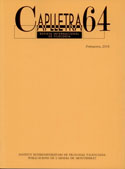Encapsulating structures with metadiscursive value in parliamentary debate: from structuring to modality
DOI:
https://doi.org/10.7203/caplletra.64.11382Keywords:
shell nouns, metadiscourse, parliamentary debate, structuring, modality Abstract
Abstract
Encapsulation by means of abstract unspecific nouns (such as conclusion, topic, reality or problem) reifies predicative discourse chunks and conceptualise them. This ability is inherent to encapsulators or shell nouns (Schmid 2000), a functional class privileged to signposting the structure of formal genres such as parliamentary debate (PD) and thus exhibiting their close link to metadiscourse. On the basis of a corpus of PD in Catalan, Spanish and English, our study deals with the metadiscursive function of some structures including an encapsulator. The framework provided by Hyland (2004) and Hyland & Tse (2005) is taking into account with this purpose. The different structures used by the addressor to organise the discourse and to interact with his or her potential addressees are analysed. The analysis of these variously fixed structures leads to establish five homogeneous cross-linguistic classes: textual organisers, sentential adjuncts, lexical connectives (Cuenca 1998), modal locutions, and two copular patterns. These classes are described functionally, formally and from their discourse functioning. Their relations with the two aspects of metadiscourse, textual and interpersonal, are observed, considering the fuzzy boundaries between both aspects.
 Downloads
Downloads
Downloads
Published
How to Cite
-
Abstract709
-
PDF (Català)447
Issue
Section
License
Authors submitting work to Caplletra for publication must be the legitimate holder of the usage rights. Legitimacy for the purposes of publishing the work must also include images, tables, diagrams and any other materials that may complement the text, whether they are the author of such material or not.
Copyright: on publishing their work in the journal, the author grants Caplletra. Revista Internacional de Filologia usage rights (reproduction, distribution and public communication) for both the paper printed version and for the electronic version.
All work published in Caplletra is covered by the Creative Commons license type Attribution-NonCommercial-NoDerivatives 4.0 (CC BY-NC-ND 4.0).
RESPONSABILITY
Caplletra. Revista Internacional de Filologia does not necessarily identify with the points of view expressed in the papers it publishes.
Caplletra. Revista Internacional de Filologia accepts no responsibility whatsoever for any eventual infringement of intellectual property rights on the part of authors.






